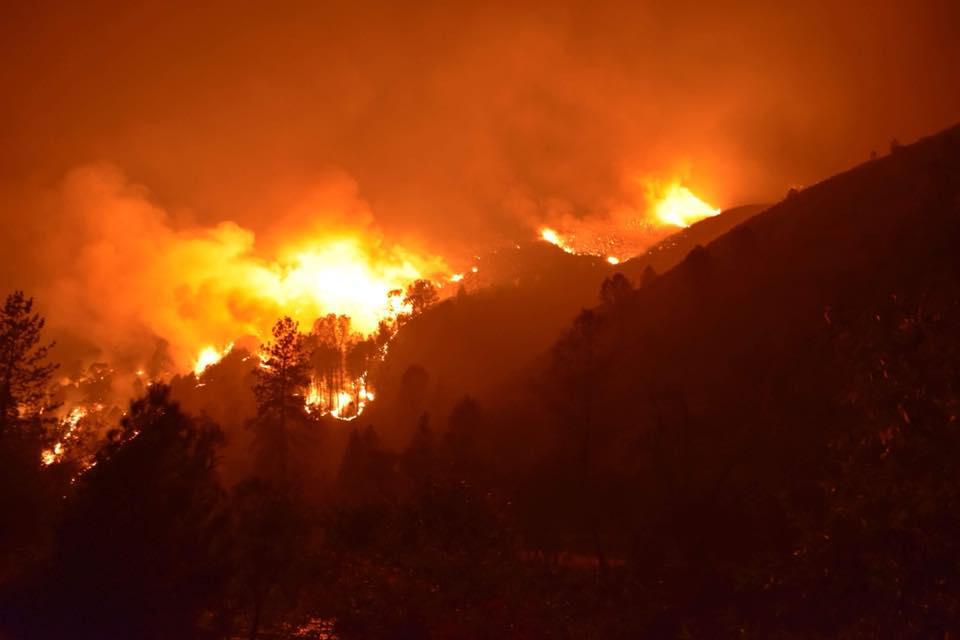
2018 Ferguson Fire in Mariposa County
Credit: Blake Scott/NPS
- Key data on non-renewal and FAIR Plan increases statewide and in areas with wildfire risk
- Non-renewal and FAIR Plan data by county
October 21, 2020 - LOS ANGELES, Calif. — Insurance Commissioner Ricardo Lara heard public input to explore regulatory actions he should consider to make insurance available and affordable for policyholders while preserving a competitive market following this year’s devastating wildfires. More than 500 people attended the California Department of Insurance’s first-ever Virtual Homeowners’ Insurance Investigatory Hearing, including homeowners, first responders, “home hardening” experts, consumer groups, and insurance representatives.
The Department also released data showing a 31 percent increase in insurance company non-renewals statewide from 2018 to 2019, primarily in areas with the highest wildfire risk. The Department presented research showing the positive impact of fire mitigation, including “home-hardening” efforts that policyholders and communities can take to reduce the risk of losing their homes in a fire.
“I have heard your nightmarish fears of losing everything that is precious to you despite your heroic efforts to protect your homes, families, and communities from wildfires, and the unfathomable frustration endured over losing your insurance anyway — despite all the actions you took to reduce the risk and stay insurable,” Commissioner Lara said at the hearing. “The people of California are strong and resilient, but we cannot just continue business as usual. Through the combined efforts of California’s people, our state and local government leaders and the insurance market, together we can reduce the risk of wildfire spread and help reinvigorate our state’s economy.”
With homeowners in rural California and the “wildland urban interface” (WUI) facing continued difficulty finding residential insurance, Commissioner Lara called on the insurance industry to work with the Department, consumers, and state and local government on solutions that allow homeowners to find and keep their insurance while enhancing competition in the insurance marketplace.
Commissioner Lara announced he will take action utilizing his existing authority as regulator of the nation’s largest insurance market, informed by public input from the hearing as well as concerns that he has heard from Californians in dozens of meetings since he took office in 2019. Actions will include, but not be limited to, the following areas:
- Building on existing home-hardening standards that are based in fire science, making them consistent and applicable to all insurance companies and the rates they seek for approval by the Department;
- Giving transparency to consumers about their wildfire risk score and what they can do to reduce it. Insurance companies use wildfire risk scores to determine which homes they will write and the premium they charge;
- Creating insurance incentives recognizing home hardening, mitigation of properties, and community mitigation actions; and
- Requiring that insurance companies stop “gaming the system” to avoid public participation in their rate filings, in order to enhance competition in the market.
Homeowners, first responders, consumer groups, and other stakeholders shared their experience at the hearing.
“In a blink, my insurance went from $1,500 per year to over $4,800, more than triple what I was paying previously,” said Colleen Cross, a retired public school educator in Nevada County about her experience following the 2018 Camp Fire in Paradise. “I hoped fire mitigation efforts would help my insurance rate when it came time to renew, but my agent said they just go by ZIP Code and fire risk zones. I continue to work on wildfire clearing but with no incentive from my insurance provider, it is discouraging.”
Rick Dinan spoke as a 20-year resident of the San Bernardino Mountains. “There’s been widespread mountain communities fire alliance non-renewals and fewer or no voluntary market options for coverage, at least until the Commissioner’s non-renewal moratorium went into effect,” he said, referring to Commissioner Lara’s implementation of Senate Bill 824 in December 2019 preventing non-renewal for those living near a declared wildfire disaster for one year. “One thing that is really concerning, and many of the speakers have commented on, is that unrecognized wildfire mitigating factors aren’t considered by insurers.”
Chief Kevin Taylor of the Montecito Fire Protection District, which suffered 23 lives lost and hundreds of homes destroyed in the debris flow in January 2018 following the Thomas Fire, said that “as our resilient community continues to recover from these two events, we’re finding that homeowner non-renewal has become one of our biggest challenges.” His department spends more than $300,000 on fuel reduction and mitigation efforts.
“Unfortunately it doesn’t appear these fire preparations, both those done by the individual and on a community-wide initiative are even considered by the insurers,” Chief Taylor said. “It is our hope in a not so distant future, that the great work done by a community to make it fire safe will weigh more heavily in the insurers’ decision whether to write policies.”
Commissioner Lara called on insurance companies to commit to writing coverage in rural and WUI communities and to play their part as risk mitigation ambassadors through pricing and by offering insurance products that incentivize home hardening, instead of shying away from higher risk areas and “cherry picking” homes with lesser risk.
- The Hearing replay will be available shortly on the Department's website
- Department of Insurance presentation at October 19 Virtual Homeowners’ Insurance Investigatory Hearing
- Key data on non-renewal and FAIR Plan increases statewide and in areas with wildfire risk
- Non-renewal and FAIR Plan data by county
- CDI wildfire resource page Source: CA. Dept. of Insurance








